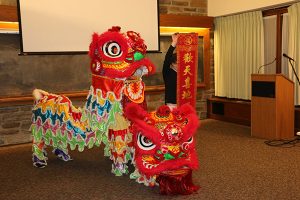I’m a third generation Bay Area-citizen. My twin brother attends a state college, as did most of my mom’s side of the family (if they attended college. My dad’s from the Philly area, but I digress.) Why would I choose to attend Bryn Mawr, a small women’s college, on the other side of the country? Why was it the right fit for me?
- Inspiring, motivating, empowering. Having a twin brother made me realize early on how women are treated and viewed differently because of their gender. My best experiences have been in all-women situations: an all-girls diversity tennis camp in 2011 and an all-girls coding camp in 2014. They both shaped my life in such large ways as I was inspired by mentors and fellow campers, learning to love activities I had little or no prior experience with. Seeing women around you leading and doing all the jobs that needs to be done teaches you that there is nothing you can’t do. It pushes you. Below, some classmates and I attended Google NYC to learn about engineering there. I can’t imagine sticking with computer science as a major at any other college because I wouldn’t have felt as supported or empowered.

Classmates from BMC and Haverford visited Google NYC
- Role models and mentors. I’ve been fortunate to find close mentors in the tech industry who I talk to fairly often–one is even the daughter of a Bryn Mawr alumna! Anyways, I’ve also found mentors and role models within Bryn Mawr in my classes (yes, my professors, but also my classmates!), on teams, in clubs, and more. Honestly, I feel mentored by peers, and think that is so neat!
- Confidence-boosting. Similar to #1, there’s something empowering about Bryn Mawr. You volunteer more in class. You ask more questions. My mom pointed it out to me over winter break after my first year at Bryn Mawr, and she’s been saying it ever since: I’m more confident. I’ve also seen it when I see my friends from high school, and they complain about being intimidated or not volunteering in class, something I do not experience at all! I can’t imagine a better place to be for me or anyone who wants to enter a typically-male-dominated field than a women’s college.

Believe it or not, I used to fear public-speaking and being on stage. No more!
- Leadership-building. Combining #1 and #2, women’s colleges have been proven to produce more leaders. Selena Rezvani, author of The Next Generation of Women Leaders: What You Need to Lead but Won’t Learn in Business School, points out this interesting statistic in “Are Women’s Colleges Still Needed?”:
What’s more, while women’s college graduates make up only a small minority of the college-educated population, one-third of the women board members of the Fortune 1000 companies are women’s college graduates, and women’s college graduates are twice as likely to earn Ph.D.s., more often going on to study the sciences and attend medical school. Of Business Week’s list of rising women stars in corporate America, 30 percent are women’s college graduates and of women members of Congress, 20 percent attended women’s colleges.
Susan Scrimshaw, former president of The Sage Colleges and a Barnard College alumna, adds onto that statement in “Yes to Women’s Colleges,” a 2006 article she wrote for The Boston Globe:
“Although only 2 percent of all women who attended a US college or university in the past 30 years were graduates of women’s colleges… they constitute…nearly 20 percent of the 2005 Fortune ’50 Most Powerful Women in Business.'”

May Day with KCass and friends.
- Diverse. When talking about women’s colleges, many say, “but it’s catty!” Many people also still think of Bryn Mawr as Bryn Mawr a few decades ago, including two of my favorite high school teachers. However, Bryn Mawr has taken many steps to making itself more accessible and diverse. I’ve met people of so many different backgrounds who have shaped who I am today. And for that, I am grateful.
- Small class sizes. My smallest class at Bryn Mawr (or Haverford) has been five students, and other classes have been fewer than ten. There is no place to hide, which can be scary, but it can also be a wonderful experience. You will feel like you matter, and you will get to know your classmates and professor(s) on an intimate level.
- Bi-Co, Tri-Co, and Penn. I love how accessible other colleges are. It makes Bryn Mawr feel bigger, and opens up so many more opportunities in terms of classes, clubs, events,

I’ll never forget doing a Lion Dance in the Bi-Co Chinese New Year Celebration my first year.
concerts, networking, and more. I attended Square College Code Camp this past summer in Atlanta (it’s usually in their San Francisco HQ), and met two Swarthmore alums on the first day. They were both expecting me, a Bryn Mawr student, and we instantly bonded. I still keep in touch with one, which relates to #8:


